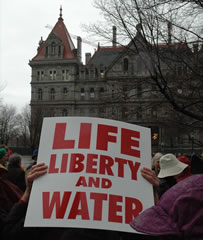New York is a hot spot to watch in the controversy over gas drilling and hydraulic fracturing (a.k.a. fracking), which the state placed a temporary ban on last year. A new report [PDF] from Common Cause/New York shows the historic levels of money dirty energy companies are spending to promote gas drilling and to overturn New York state’s ban on fracking.
In the state’s last legislative session, more than thirty gas-related bills aiming to create panels, commissions and task forces were proposed in order to investigate a wide range issues ranging from environmental impacts to economics, as well as two fracking moratorium proposals.
Notably, last August, the state Senate voted 48-9 in favour of S8129B which prevents the Department of Environmental Conservation (DEC) from issuing fracking permits until the Supplemental Generic Environmental Impact Statement (SGEIS) evaluating shale gas drilling has been finalized. The bill easily passed the Assembly 93-43 late November 2010. However, on December 13, 2010, Governor David Paterson vetoed the legislation, instead issuing an Executive Order prohibiting fracking of horizontally drilled wells until about July 1, 2011. In February, the state announced plans to put fracking rules in place by June in order to green-light the controversial practice just as the ban runs out.
In terms of lobbyist spending, the Common Cause/NY report shows that the dirty energy companies and industry front groups fighting against the moratorium on fracking outspend environmental organizations and others supporting the ban by a margin of 4:1.
Three gas companies in particular, Chesapeake Appalachia, Fortuna Energy and The Williams Companies, and their trade group, Independent Oil and Gas Association of New York (IOGA) lobbied against the moratorium bills.
Chesapeake Appalachia, the second largest gas producer in the U.S. spent the most ($1,090,051) lobbying for fracking interests in 2010. All told, in 2009, industry spent $1,231,673 in lobbying, and a further $1,564,428 in 2010.
In contrast, the 2010 combined lobbying sum from the five top environmental groups, namely Riverkeeper, The Sierra Club, Environmental Advocates of New York, Citizens Campaign for the Environment and Natural Resources Defense Council, was $485,222.
Susan Lerner, executive director of Common Cause/NY stated:
“There is a tremendous amount of public interest in this determination of how New York state is going to handle the challenge of hydrofacking, and there are strong feelings among the public among different groups.”
“It is a real test of our government’s ability to make a well-reasoned public policy determination, so I think it is particularly important for the public to know who is involved in trying to move the Legislature and the governor, and for the public to keep an eye on the situation to make sure decisions are made based on sound public policy.”
So, what else is new?
Today, hundreds of New Yorkers are heading to Albany to warn the Governor and state lawmakers about the dangers gas drilling has in store for New York (see the New York Times series “Drilling Down”).
Roger Downs, conservation program manager with the Sierra Club Atlantic Chapter,
“From start to finish, fracking is an industrial process that threatens water, and in some cases radioactive waste water is produced. Fracking has poisoned water in other parts of the country, and we can’t allow that to happen in New York.”
Fully aware of the public outcry, some lawmakers are preemptively calling for tougher water protections and a lasting fracking ban. Senators Liz Krueger (D-Manhattan), Ranking Member of the Environmental Protection Committee Tony Avella (D-Queens) and Joseph Addabbo (D-Queens) offered four bills increasing regulatory oversight to protect freshwater supplies, and a long-term fracking ban.
S.425 (Krueger) – Would provide greater regulation of the use of hydraulic fracturing fluids used for oil and gas drilling, including prohibiting the use of frac fluids containing chemicals that pose a risk to human health.
S.2697 (Avella) – Would provide for comprehensive regulation of oil and natural gas operations.
S. 4251 (Addabbo) – Would require treatment works to test waste from hydraulic fracturing operations for radioactivity.
S.4220 (Avella) – Would prohibit the use of hydraulic fracturing in the process of drilling for natural gas and/or oil.
Sen. Krueger said:
“I don’t see it as that great of a request to require these gas companies to inform the public on what chemicals they’re blasting into the Earth. They want us to just fall into line and not ask any questions, to just ‘trust them.’ Well, we saw what they did with Pennsylvania’s trust, and I say no. Not here, not in New York.”
Sen.Avella remarked:
“Perhaps our greatest resource as New York City residents is the clean, unfiltered and refreshing water we receive every time we turn on our faucets. It is clear to me, that until we can be assured that the practice of hydrofracking presents absolutely no threat to New York’s residents and their drinking water, we must completely ban fracking.”
Sen. Addabbo added:
“…My new bill authorizes the DEC Commissioner, after hosting a public hearing, to force regulations requiring treatment facilities handling wastewater to test for radioactivity levels. The DEC will identify tests to be performed on the water, including ingredients found within the hydrofracking fluids, and would prohibit the acceptance, treatment or discharge of hydrofracking-produced waste. This was in response to EPA and drilling industry studies that concluded radioactivity in drilling waste cannot be fully diluted in rivers and other waterways.”
Despite the massive influx of industry money and lobbying muscle designed to sway policy surrounding gas industry practices, these lawmakers are listening to the public’s concerns about the dangers of gas drilling and fracking. With these four new pieces of legislation, the fracking green-light issued in February may not come to pass. The pressure is now on current Governor Andrew Cuomo to reverse the fracking rush and follow the lead of his Senate and Assembly colleagues by supporting a fracking ban.
Subscribe to our newsletter
Stay up to date with DeSmog news and alerts







